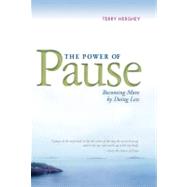
| A Word from Terry | p. xi |
| Letting Our Souls Catch Up | p. xix |
| Early Winter | |
| Fear and Dancing | p. 3 |
| Two Spaces | p. 7 |
| Washing Dishes | p. 10 |
| The Gift of the Moon | p. 13 |
| New Rules | p. 17 |
| The Wonder of a Child | p. 23 |
| For Christmas: Joy to the World | p. 29 |
| Late Winter | |
| The Dark Side | p. 35 |
| I'm Closed Now | p. 39 |
| Changing the Questions | p. 43 |
| Dragons Can Be Pink | p. 46 |
| Simplicity | p. 49 |
| Unreasonable Grace | p. 53 |
| Early Spring | |
| Broken and Crippled | p. 59 |
| Pause Button | p. 64 |
| Duckling Moments | p. 68 |
| Bless Me | p. 71 |
| Full | p. 74 |
| Damage Control | p. 77 |
| For Easter: Home | p. 82 |
| Late Spring | |
| Dandelions | p. 87 |
| Putting Down the Sack | p. 90 |
| What We Want to See | p. 94 |
| Enough | p. 97 |
| Kindness | p. 101 |
| Five More Minutes | p. 104 |
| Early Summer | |
| Broken Glass | p. 111 |
| Time Management | p. 114 |
| It's the Little Things | p. 119 |
| Losing What I Don't Need | p. 122 |
| Big Swords | p. 126 |
| The Balanced Life | p. 131 |
| Late Summer | |
| Holy Longing | p. 139 |
| Rested Mules | p. 142 |
| How Big Is Your Frying Pan? | p. 146 |
| No Cows to Lose | p. 150 |
| Uncle George | p. 153 |
| Play | p. 158 |
| For Ordinary Time: Ordinary Bliss | p. 164 |
| Early Autumn | |
| Shadows | p. 171 |
| Without a List | p. 177 |
| The Seven Wonders of the World | p. 181 |
| Fully Alive | p. 185 |
| Inner Rebel | p. 189 |
| Love or Fear? | p. 195 |
| Late Autumn | |
| Glory in the Gray | p. 203 |
| Making Space to Hear the Heart | p. 209 |
| God's Other Book | p. 212 |
| Kiss Still Works | p. 217 |
| The Farmer's Miracle Dog | p. 222 |
| Heaven on Earth | p. 225 |
| For Thanksgiving: Living Room | p. 231 |
| Acknowledgments | p. 235 |
| Table of Contents provided by Ingram. All Rights Reserved. |
The New copy of this book will include any supplemental materials advertised. Please check the title of the book to determine if it should include any access cards, study guides, lab manuals, CDs, etc.
The Used, Rental and eBook copies of this book are not guaranteed to include any supplemental materials. Typically, only the book itself is included. This is true even if the title states it includes any access cards, study guides, lab manuals, CDs, etc.